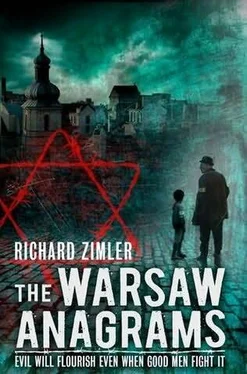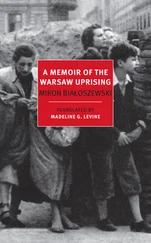‘But you left nothing on Anna,’ Izzy interjected.
‘She was the first. I was too shocked and upset to think of how I might leave a clue behind. Only when Adam was left with me did it occur to me how I could do it without risking too much.’
‘If Lanik had discovered the string or gauze, what would you have said?’
‘That it was carelessness on my part. He wouldn’t have guessed. The Germans aren’t talking in code like the Jews.’
‘That was a good and brave attempt to help me,’ I told him. ‘Thank you.’
‘After what I’ve done, you’re thanking me?’
‘Under the circumstances, you did the best you could.’
Jesion grimaced, then raised a quivering hand to his head, dizzy. We sat him down at his table, and he leaned over and cried as if life were spilling out of him.
At length, I asked him, ‘How many children have been murdered so far?’
‘Four – three boys and a girl.’
‘Then there’s one I don’t know about,’ I told him.
‘Probably the first of the boys – he came in just after Anna. He wasn’t from the ghetto. Lanik told me he and his family had been in hiding.’
‘How did Lanik find him?’
‘Christians denounce Jews in hiding all the time. It’s become the national sport.’
‘The body of this boy… Where was it left?’ I asked.
‘I don’t know. I don’t ask.’ Jesion sneered. ‘The son-of-a-bitch has his chauffeur bring the dead children here at night, and he tells me what I’m to do. When I’m done, he takes the body away. That’s all I know.’
‘And how does Lanik kill them?’
‘My guess is that he offers them poisoned food. He once told me they come to him famished.’
‘Have you ever heard of Mikael Tengmann?’ I asked.
‘No, who’s he?’
‘A doctor in the ghetto – an old friend of Lanik’s. He’s the one who identifies children who have birthmarks or blemishes.’
‘I see. So how did you find me?’
‘A courageous girl helped me figure out who the murderer was.’
‘Was it Lanik’s stepdaughter Irene?’ he questioned.
‘You know her?’ I asked in astonishment.
‘She and her mother often come into town to buy their meat from me.’
‘So did you tell Irene that her stepfather was ordering you to cut up the children?’
‘No, it wasn’t me. I couldn’t risk that. I was careful not to let on.’
‘Then one of them must have overheard Lanik discussing the murders or seen the skin you’ve taken from the children. Or Irene figured things out from other clues we’ll never know about.’
‘Does Lanik photograph the skin?’ Izzy questioned.
‘I’m not sure. All I really know is that it has something to do with a transfer he wants to a more important job. When the first boy was brought to me, he told me that he needed the skin around his birthmark for a present he would be carrying with him to a camp – to Buchenwald. As best I can figure out, he’s eager to work there so that he can perform experiments on the prisoners – medical experiments involving how to cure burns. That’s his speciality, as I understand it. I think he left a couple of days ago for there. I’m betting he took the children’s skins with him, though he talked of bringing them to a craftsman in leather before going and I’m not sure he’s had time to do that yet.’
‘Who’s the gift for?’
‘Someone at Buchenwald, but I don’t know who. Whether he hopes to prove some racial theory with the Jewish skin or simply ingratiate himself to some madman there, I haven’t any idea.’
‘Why did he pick you to desecrate the children for him?’ I asked.
‘Lanik found out that my mother was Jewish. He threatened to have her and the rest of our family sent to the ghetto. Mama is seventy-seven years old. She wouldn’t survive a week in there. I didn’t have any choice.’
‘Do you know where Lanik’s office is?’ Izzy asked.
‘Yes, it’s across the street – the second door to the left of the church. He’s on the first floor, but getting to him will be risky for you. His patients are all collaborators and Germans – soldiers, Gestapo officers… I go there to make deliveries on occasion, and he keeps a heavily armed guard by the door.’
‘Where does he eat lunch?’ I questioned.
‘I’ve seen him at a German restaurant nearby – a kind of beer garden.’
‘Is it crowded?’
‘Sometimes.’
I wasn’t sure what to do, but Izzy saved the day; he took out the note he’d typed at home and handed it to me. It read:
Rolf, please come to the Cathedral in Praga at 1 p.m. I’m in trouble with the Jewish Council and need your help. Don’t fail me, I beg of you. My life is in your hands.
At the bottom, Izzy had forged Mikael’s signature beautifully, having found it at the end of Adam’s medical file.
‘You make a better detective than I do,’ I told him gratefully.
‘Those who lead a double life learn the ways of stealth,’ he replied. A one-line poem he’d wanted to tell me for decades, I guessed.
I handed the note to Jesion. ‘Go ahead, read it,’ I told him.
When he was finished, Izzy said, ‘Lanik doesn’t yet know that we’ve identified Mikael Tengmann as his accomplice, and he’ll believe the appeal for help is real. They’re old friends, so he’ll go to Praga.’
‘Do you know if there are Germans patrolling the bridges over the river?’ I asked the butcher.
‘Sometimes, but you should be safe at lunch time. With so many people going back and forth, they don’t usually make trouble. But do you intend to kill him in the Praga Cathedral?’ he asked in a horrified voice.
‘If you can tell me how to lure him to a synagogue,’ Izzy told him with a crafty smile, ‘I’ll happily shoot him there.’
Jesion put our note in an envelope and took it across the street to Lanik; he planned to say it had been dropped at his shop by a ghetto courier. Ten minutes later, he was back, out of breath.
‘I gave the note to him, but he didn’t read it in front of me,’ he told us worriedly.
‘But you did tell him that the courier had said it was urgent?’
‘Of course.’ The butcher grimaced. ‘He asked me what the man looked like, and I couldn’t think of how to reply, so I described Jan Kiliński on his statue in Krasinskich Square – with that peasant hat and heroic moustache. It was all I could think of.’
Izzy had a good laugh, which made Jesion smile. ‘I didn’t foul things up?’ he asked us.
‘No, you did good,’ I told him.
‘What’s Lanik look like?’ Izzy asked.
‘He’s tall, over six feet, and he has dark brown hair that he wears very short, parted on the left.’
‘That’s it then,’ Izzy said cheerfully. ‘We’re off!’
Jesion reached for him. ‘Listen, I’ve been thinking,’ he said. ‘A gun makes a lot of noise, but a knife…’
The steel blade was four inches long, slightly curved, the handle polished ebony. It fitted into my hand as if it had always been mine. I kept it in its leather sheath, concealed in the inside pocket of my overcoat.
Jesion’s last words to me were, ‘If you free me from that son-of-a-bitch, I’ll bless you in my prayers for ever!’
We encountered no difficulties on the bridge to Praga and headed straight to Jaśmin’s apartment, but she wasn’t home. The caretaker of her building told us she sometimes returned for lunch, usually just after noon.
To kill time, we sat at a café sipping weak coffee that had the unlikely aftertaste of smoked fish, then waited for Jaśmin down her street. Izzy and I hardly spoke; the murder we’d planned was too greedy for our attention.
Jaśmin never showed up. At 12.35 we couldn’t wait any longer and made our way to Floriańska Street, and from there to the cathedral. We found it nearly empty. Two elderly women sat in the first pew – sisters, I guessed, since they had the same tight bun of grey hair and finchlike compactness. A balding middle-aged man with a bandage over his left ear sat in the third-to-last row, his sullen lips sculpting prayers, his eyes closed. We spotted no priests.
Читать дальше












